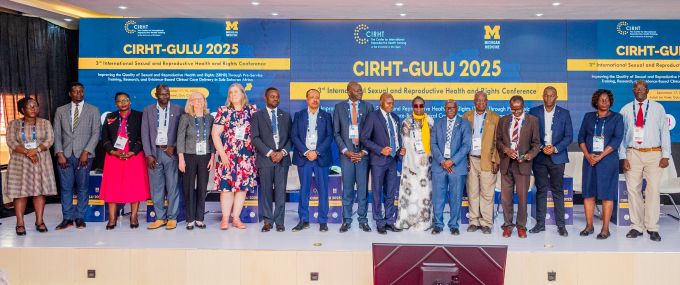LIRA CITY, September 26, 2025 – The Government of Uganda has been urged to do more to economically empower married women to reduce unsafe abortion in the country.
According to a research study carried out at Lira Regional Referral Hospital between December 2022 and April 2023, married women with a monthly income of less than Shs 100, 000 to Shs 250,000 were 2.6- 2.8 percent more likely to have unsafe abortions compared to women whose total monthly income was more than Shs 500,000.
The research titled Prevalence and Factors Associated with Unsafe Abortion among Married Women admitted in Gynecology Ward at Lira Regional Referral Hospital, Lira City Northern Uganda was authored by Betty Apio.
Apio presented the research findings during a sexual reproductive health rights conference organized by Center for International Reproductive Health Training [CIRHT] at the University of Michigan, Gulu University and Lira University held at Acholi Inn Hotel in Gulu City last week.
She noted that out of 368 participants sampled, 48 percent of the respondents had carried out unsafe abortions because they could not afford to take care of the child if they chose to carry the pregnancy to full term.
“Through the study, we found out that marriage does not protect women against risks associated with unsafe abortions. These are groups of women, usually from rural areas who lack access to contraceptives, safe abortion services and accurate reproductive health information,” Apio said.
She stressed the importance of economically empowering women as one strategy of reducing unsafe abortions.
“Government needs to expand access to contraceptives in rural areas and also develop more economic empowerment programs to support women. Being economically empowered will ease access to reproductive health services,” Apio said.
Government is currently implementing various poverty alleviation programmes such as Grow project, the Parish Development Model [PDM] and Uganda Women Entrepreneurship Programme [UWEP] which target women.
Despite being illegal in Uganda, abortion is common.
Globally, between 8-18 percent of maternal deaths arise from unsafe abortions, according to Gutmacher, an online health resource.
Dr. Willie J Parker, a reproductive health justice advocate and clinical training specialist at CIRHT in Michigan, US, noted that because abortion is illegal in many countries and also frowned upon in countries where it is legal, many women resort to dangerous methods of abortion, risking their lives and health.
Parker said that unsafe abortion is a preventable tragedy.
“Abortion can be an entry point for comprehensive health service delivery for women. When a woman comes to seek an abortion, that’s an opportunity to screen for Sexually Transmitted Infections [STIs], cervical cancer screening, contraceptive counselling and provision to prevent future unintended pregnancies,” he said.
Dr. Richard Mugahi, the Commissioner In-charge Maternal and Child Health at the Ministry of Health noted that the ministry has made progress in preventing maternal death by more than 60 percent in the last 20 years.
He however said that the ministry still has a lot to do to prevent maternal deaths, “We have improved access to maternal health but we still have a lot to do.
We have built health facilities but what is remaining is provision of quality care. When the women come to our facilities, do they get quality care? So we need more human resource, to strengthen supervision, strengthen logistics systems to ensure that supplies are available all the time,” Mugahi said.
Meanwhile, CIRHT is currently working with ministries of health and education, higher education institutions and teaching hospitals in several African countries including Uganda, Kenya, Rwanda, Burundi, Tanzania, South Sudan, South Africa, Zambia, Benin and Cameroon to address capacity building and expand reproductive health services.
Topics around comprehensive abortion care, family planning and sexual reproductive health rights were addressed by experts during the training.
https://thecooperator.news/new-clinical-handbook-launched-to-support-quality-abortion-care/
Buy your copy of thecooperator magazine from one of our country-wide vending points or an e-copy on emag.thecooperator.news
